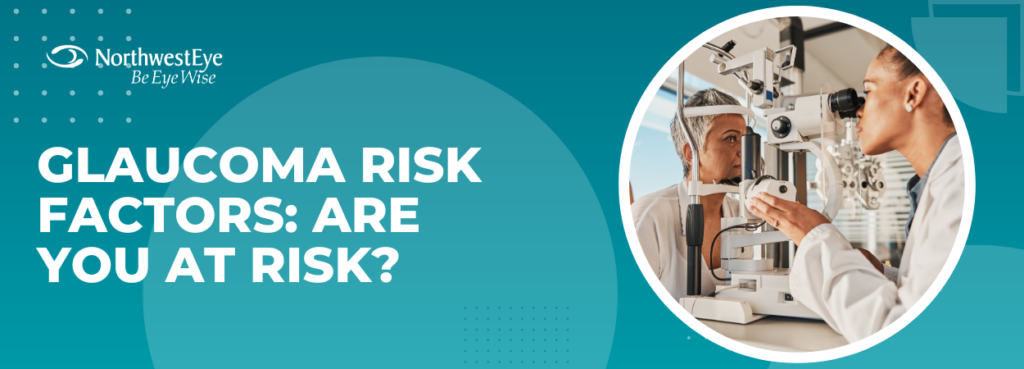Posted by: Northwest Eye in News on January 13, 2025

Glaucoma is one of the leading causes of vision loss worldwide, often developing silently before any noticeable symptoms arise. Understanding your risk factors is crucial for early detection and prevention. At Northwest Eye, our specialists are dedicated to helping you identify and manage these risks to protect your vision for years to come.
Key Risk Factors for Glaucoma
- Age: Glaucoma becomes more common as we age, particularly in individuals over 60. Regular eye exams become increasingly important as you grow older to catch any early signs of the condition.
- Family History: If glaucoma runs in your family, your risk increases significantly. Genetic predisposition plays a key role, making it vital to share your family history with your eye care provider.
- Ethnicity: Certain ethnic groups are at higher risk. For example, African Americans and Hispanics have a greater likelihood of developing glaucoma compared to other populations. Asians are more prone to a specific type known as angle-closure glaucoma.
- High Eye Pressure: Eye pressure refers to the pressure inside your eye caused by the fluid it contains. High eye pressure is one of the most important risk factors. While not everyone with high eye pressure develops glaucoma, it’s an important indicator that your eye specialist will monitor closely.
- Certain Medical Conditions: Conditions such as diabetes, high blood pressure, and heart disease can contribute to an increased risk of glaucoma. Managing these conditions can be beneficial for your eye health as well as your overall well-being.
Lifestyle Considerations to Reduce Risks
While some risk factors like age and genetics are beyond your control, there are proactive steps you can take to protect your vision:
- Regular Exercise: Staying active can help reduce eye pressure and improve overall eye health. Activities such as walking, jogging, yoga, and swimming not only keep you fit but also promote healthy blood flow to the eyes, which is essential for maintaining optimal eye pressure.
- Manage Overall Health: Controlling chronic conditions like diabetes and hypertension can reduce your glaucoma risk. Keeping blood sugar and blood pressure levels within a healthy range not only lowers the risk of glaucoma but also helps maintain the health of the blood vessels in your eyes. This ensures proper nutrient and oxygen delivery to eye tissues, reducing the likelihood of damage that could contribute to glaucoma.
- Protect Your Eyes: Use protective eyewear to avoid injuries that could lead to glaucoma, especially if you engage in high-risk activities.
- Routine Eye Exams: Early detection is key. Comprehensive eye exams allow specialists to monitor your eye pressure and optic nerve health.
How Northwest Eye Can Help
At Northwest Eye, we specialize in identifying and managing glaucoma risks. Our team of experienced ophthalmologists and optometrists use advanced diagnostic tools to monitor your eye health, ensuring any issues are addressed promptly.
“Glaucoma is a complex condition, but early detection can make all the difference. At Northwest Eye, we prioritize individualized care to help patients understand their risk factors and maintain their vision for years to come,” says Dr. Kamran Nejad, one of our esteemed glaucoma specialists.
Whether it’s through personalized treatment plans or regular check-ups, we’re here to help you preserve your vision.
Don’t wait for symptoms to appear—take control of your eye health today. Schedule an appointment with Northwest Eye to discuss your risk factors and learn how we can support your vision care journey.






